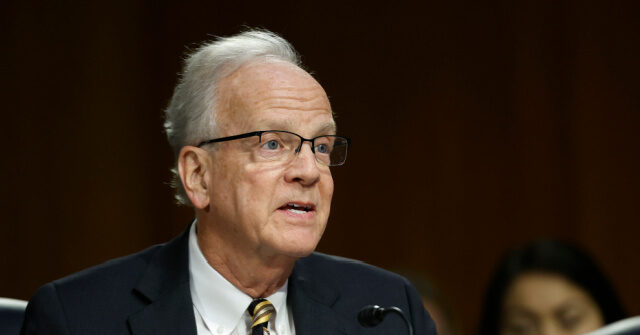Sen. Jerry Moran (R-KS) told Breitbart News it is now time to reform antiquated FCC media broadcast rules that were “written before the internet.”
“Broadcasters across Kansas have expressed to me the need for modernized FCC rules in this digital age. Many of the Federal Communications Commission (FCC) rules governing broadcasting were written before the internet was created, and it’s time for change that is driven by the industry to bring our broadcasting rules into the 21st century,” the Kansas senator told Breitbart News in a written statement.
The FCC has not updated its broadcast ownership rules since the 1990s, back when few could conceive of digital tech platforms, streaming services, and smartphones.
Lawmakers in both chambers of Congress, FCC Chairman Brendan Carr, and others have called to repeal the national audience reach cap update, local television ownership limits, and modernize local radio station sub-caps.
Current rules limit a single entity’s ability to own television stations which reach more than 39 percent of American television households. Another regulation bars the number of big four broadcast television networks a company can own. Otherwise known as the “top 4” rule, it applies to ownership of ABC, CBS, Fox, and NBC affiliate stations.
Rank-and-file and Senate Republican leadership in early May called on the FCC to reform these outdated rules, believing it would help local news outlets and stations better compete against big tech platforms, which do not have a cap on their outreach.
Moran led the coalition of 22 Republican senators.
“Without the opportunity to combine or expand operations, broadcasters struggle to invest in journalism, retain sufficient newsroom staff, and strain to compete against their unregulated global Big Tech competitors,” Moran Senate Republicans wrote to Carr. “By modernizing broadcast ownership restrictions, the FCC can empower broadcasters to fulfill their essential role in American democracy, foster local journalism, and benefit local communities […] Updating these rules will strengthen local journalism, enhance public interest, and ensure broadcasters can compete in a digital age, not just survive it.”
Over 70 bipartisan lawmakers wrote to the FCC in early April, calling on the telecommunications regulatory agency to back these changes:
Across the political spectrum, Americans trust their local news more than any other source. Broadcasters play an indispensable role in holding government accountable, fostering civic engagement, and ensuring public safety awareness – often early on the scene in a crisis and last to leave. They do all this while restrictive ownership rules continue to deny them the ability to obtain the vital investment necessary to sustain and expand local coverage.
At a time when newspapers are battling to survive, broadcasters’ local engagement is more important than ever. When broadcasters cannot combine or expand operations, they struggle to maintain sufficient newsroom staff and invest in journalism. This increasing lack of access to local information leaves communities vulnerable to misinformation from unverified sources on social media.
Carr said in an interview at the Milken Institute in May:
We have these arcane, artificial limits on how many TV stations any one company can own. But of course, that doesn’t apply to big tech. So you have, you know, relatively small TV station groups that are competing with Google and Facebook and others in the advertising part. So I want to ultimately empower those local stations and, frankly, constrain some of the power of those national programmers.
Conservative groups and other outside groups have backed the measure.
Heritage Action for America, Citizens for Renewing America, and others wrote to Carr in mid-May:
Local broadcasters compete directly with Big Tech, streaming services, andsocial media platforms in the marketplace of consumer content. Yet, unlike their competitors such as YouTube and Facebook, broadcasters are limited by the ownership rules in how many households and consumers they can reach. This is an inherent disadvantage.
The National Association of Broadcasters (NAB) has also launched a Modernize the Rules campaign to urge the FCC to modernize these regulations.
Carr has sought for years to update these rules.
During a 2018 statement, he said:
Unfortunately, the Commission has taken an ostrich-like approach to this requirement in nearly every one of its quadrennial reviews, including the instant review. Indeed, the Commission has consistently ignored Congress’s deregulatory mandate under the statute, the realities of the modern media marketplace, and the many ways that Americans now consume news, information, and entertainment programming. This failure does not serve anyone’s interest, as a broad range of stakeholders have made clear in this record—once again. But despite a record bursting with evidence of a vibrant media marketplace, the Commission continues to advance the fiction that broadcast radio and broadcast television stations exist in markets unto themselves.
He even lamented, eight years ago, that the lack of media ownership reform, has led to big tech to outcompete newspapers and other outlets because of the agency’s hesitancy to update its rules:
Our prohibition on newspaper-broadcast crossownership only made it harder for them to gain the scale needed to compete with the Internet giants. When we finally eliminated the prohibition in 2017, it was too late for much of the industry—1,800 newspapers had gone out of business since 2004 alone. They were facing competition from market segments that the FCC refused even to recognize. The result?
Carr added, “Communities across the country lost access to local news and information at least in part because the FCC failed to react quickly enough to
changes in the marketplace.”
Sean Moran is a policy reporter for Breitbart News. Follow him on X @SeanMoran3.
Read the full article here


